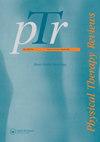Relationships matter: a qualitative study of physiotherapy students’ experiences of their first clinical placement
IF 0.8
Q4 REHABILITATION
引用次数: 1
Abstract
Abstract Background Students’ experiences of the clinical learning environment are crucial to learning and professional development. Earlier research using the Undergraduate Clinical Education Environment Measure shows that students’ perceptions of supervision vary significantly between undergraduate programs, with physiotherapy students scoring higher than other students. Objectives We explored physiotherapy students’ experiences of supervisors’ preparedness, familiarity with learning outcomes, and supervision practices during their first clinical placement. Methods Individual semi-structured interviews were conducted with 13 physiotherapy students. The interviews were analyzed using qualitative content analysis according to Graneheim and Lundman. Major findings Within the latent theme A coherent whole throughout the placement, three manifest categories were found: Establishing a relationship, Fostering active participation, and Cultivating outcome-based learning. The students valued a supervisor who was prepared for the initial meeting and wanted to establish a relationship. When the students experienced a sense of trust, they dared to ask questions. The supervisors encouraged students to move beyond the one-to-one relationship and cooperate with others in the community to develop autonomy. Self-assessment enabled the students to identify their own learning needs and enhanced the possibility of achieving intended learning outcomes. The supervisors repeatedly returned to the learning outcomes. Conclusions Physiotherapy students highly regarded supervisors who established a relationship and fostered active participation by being available, promoting student autonomy, and encouraging cooperation in the community. The continual use of intended learning outcomes helped students identify their learning needs and achieve the outcomes.关系很重要:对物理治疗学生第一次临床实习经历的定性研究
摘要背景学生对临床学习环境的体验对学习和专业发展至关重要。早期使用本科临床教育环境测量的研究表明,学生对监督的感知在本科专业之间存在显著差异,物理治疗专业的学生得分高于其他专业的学生。目的探讨物理治疗专业学生在首次临床实习期间对导师的准备、对学习成果的熟悉程度以及导师的实践经验。方法对13名物理治疗学生进行半结构化访谈。访谈采用Graneheim和Lundman的定性内容分析法进行分析。在贯穿整个安置的潜在主题中,发现了三个明显的类别:建立关系,促进积极参与和培养基于结果的学习。学生们看重的是一位为初次见面做好准备并希望建立关系的导师。当学生们感受到信任感时,他们就敢于提问。导师鼓励学生超越一对一的关系,与社区中的其他人合作,发展自主性。自我评估使学生能够识别自己的学习需求,提高了实现预期学习成果的可能性。主管们反复提到学习成果。结论物理治疗学生对导师的评价很高,他们与导师建立了良好的关系,并通过提供帮助、促进学生的自主性和鼓励社区合作来培养学生的积极参与。持续使用预期的学习成果有助于学生确定他们的学习需求并取得成果。
本文章由计算机程序翻译,如有差异,请以英文原文为准。
求助全文
约1分钟内获得全文
求助全文
来源期刊

Physical Therapy Reviews
REHABILITATION-
CiteScore
1.30
自引率
0.00%
发文量
26
期刊介绍:
Physical Therapy Reviews is an international journal which aims to publish contemporary reviews, discussion papers and editorials within physical therapy, and in those basic and clinical sciences which are the basis of physical therapy. The journal is aimed at all those involved in research, teaching and practice within the area of physical therapy. Reviews (both descriptive and systematic) are invited in the following areas, which reflect the breadth and diversity of practice within physical therapy: •neurological rehabilitation •movement and exercise •orthopaedics and rheumatology •manual therapy and massage •sports medicine •measurement •chest physiotherapy •electrotherapeutics •obstetrics and gynaecology •complementary therapies •professional issues •musculoskeletal rehabilitation
 求助内容:
求助内容: 应助结果提醒方式:
应助结果提醒方式:


